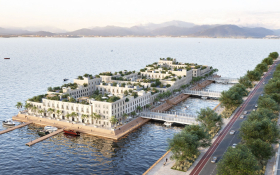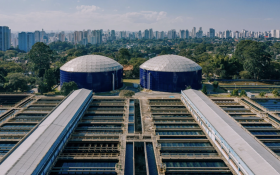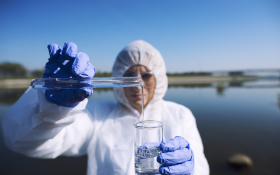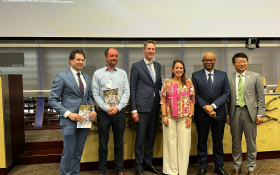RINEW-partners start sewer mining pilot at city farm in Rotterdam, the Netherlands
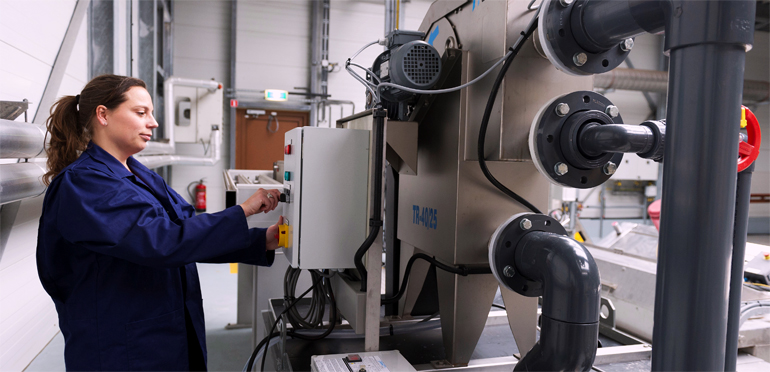 Partners of the research project Rotterdam innovative nutrients energy and water (RINEW) officially started a pilot research to recover resources and water from municipal wastewater.
Partners of the research project Rotterdam innovative nutrients energy and water (RINEW) officially started a pilot research to recover resources and water from municipal wastewater.
The water treatment installation features a newly developed ceramic nanofiltration membrane.
The installation is located on a city farm where the recovered water can be used as irrigation water for example.
Mayor Ahmed Aboutaleb of Rotterdam officially commissioned the installation by watering some plants with recovered irrigation water on 11 December.
Partners in the RINEW-project are the city of Rotterdam, water supply company Evides Waterbedrijf, and three regional water authorities, being Delfland, Hollandse Delta and Schieland Krimpenerwaard.
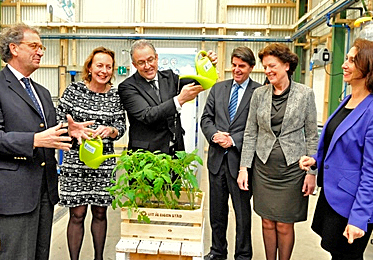 Mayor Ahmed Aboutaleb of Rotterdam uses the recovered waste water to water the crop.
Mayor Ahmed Aboutaleb of Rotterdam uses the recovered waste water to water the crop.
Sewer mining
The municipal wastewater that arrives at the city farm is first treated with two fine screens (on top photo) that recover cellulose fibers, mainly originating from toilet paper.
The cellulose fraction is dewatered and has the potential to be used as isolation material or even as activated carbon for water treatment.
Within the RINEW-project the conversion of this cellulose fraction to glucose is part of the research. With the glucose it is possible to produce bioplastic.
Ceramic nanofiltration
Following a flotation unit the next step in the treatment is ceramic nanofiltration. The big advantages of this membrane are its high mechanical strength and its chemical stability.
The wastewater is concentrated with at least a factor 5, which results in a more than 80 percent water recovery.
Reversed osmosis and UV-disinfection
The permeate of the nanofiltration is then treated by a reverse osmosis and finally by a UV-disinfection. This results in high quality demineralized water.
The concentrates from both the ceramic nanofiltration, and the reversed osmosis, are used to recover nutrients by precipitation and humic acids by ion exchange.
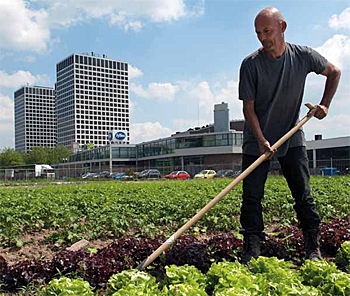 Recovery of phosphate and humic acids
Recovery of phosphate and humic acids
Specifically the recovery of phosphate and humic acids are examined. The phosphate can be reused at the city farm as fertilizer, the humic acids as soil conditioner.
The city farmers can use this demi water to irrigate any crop. If required that can add any amount of nutrients, depending on the type of crop they want to grow.
The RINEW-project will run until 2017.
The objective is to explore technical options to recover materials and to upscale the recovery to commercial feasible waste water treatment technology.
This news item was originally published on the website of Evides Waterbedrijf and Stadshavens Rotterdam (in Dutch only).
More information
Evides Waterbedrijf
Rotterdam, the Netherlands
+31 900 0787
www.evides.nl
Stadshavens Rotterdam
Rotterdam, the Netherlands
+31 10 283 38 00
www.stadshavensrotterdam.nl/en
